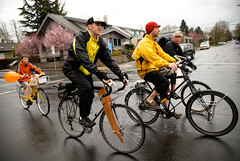What happens in places that have a mandatory, all-ages helmet law on the books? Do injury rates decline? Does bike ridership go down? That’s the conventional wisdom; but is it true? Nearly three years after passing such an ordinance, the effect of Vancouver’s helmet law is difficult to ascertain. Our Vancouver correspondent Marcus Griffith took a closer look and found some surprising results.

own helmet to city council to make
his case for an all-ages helmet law
back in 2008.
(Photos © J. Maus)
Passed by city council in 2008, Vancouver’s all-ages helmet law has largely gone unenforced and, it seems, widely ignored. Bike use continues to climb in the city and for some reason, a local hospital reports that bike-related head injuries are actually on the increase.
According to Vancouver Police Department (VPD) spokesperson Kim Kapp, enforcing the helmet law is a “low priority,” when compared to responding to 9-1-1 calls. Judging by how few violations have been issued, it seems most patrol officers would agree with her.
Between January and October 2010, the Vancouver Police Department (VPD) issued a total of 20 citations for violating the helmet ordinance, according to Kapp. (The specific type of activity — biking, skateboarding, and so on — the person was doing when cited was not immediately available.)
“One of the concerns [with the helmet law] was that it would discourage bicycling, but that doesn’t seem to be happening.”
— Todd Boulanger, a former transportation planner for the City of Vancouver
In addition to the formal citations, the police department has conducted “a lot of public education” and given numerous warnings, but according to Kapp, the warnings would be “verbal in nature” and not tracked by police or court records.
Although Kapp highlighted the public safety aspect of the law, she pointed out the helmet law provides a valid reason for a law enforcement officer to stop someone riding without a helmet who is suspected of a more serious crime.
Such was the case, Kapp said, when a VPD officer arrested 46 year old Harold Akey in late October for suspicion of several home robberies.
“The patrol officer noticed that [Akey] seemed out of place loaded down with a large bag and a really nice bike,” said Kapp.
Akey’s lack of a helmet while biking is what allowed the officer to stop and investigate his suspicions, according to Kapp. It turned out that not only did Akey have a duffle bag full of stolen property; the bike he was riding was also stolen, according to Kapp. Akey plead guilty to felony charges related to the incident a few days ago.
With the relative lack of enforcement and limited outreach, it should come as no surprise that the helmet law has little influence on helmet use.
According to city staff, the City of Vancouver allocated $5,000 for public outreach and the purchase of helmets: $3,200 was spent in 2008 and $1,800 in 2009. However, due to budget constraints, the police and city personnel involved in the outreach program were laid off and could not be reached for comment.
in the ER at Southwest
Washington Medical Center
(*whether or not a helmet was
used is not known):
into effect in 2/08)
An informal survey of 37 adult cyclists in the Vancouver area was conducted by the author last week. No respondent indicated the helmet law was a factor in deciding helmet use and 12 (32%) indicated they didn’t know Vancouver had an all-ages helmet law.
Interesting enough, while 24 (65%) of the respondents stated he or she wore a helmet at least most of the time when cycling, only 3 (8%) of respondents reported favoring the all-ages helmet law. Nine (24%) stated they rarely, or never, wore a helmet.
The results of the survey did not surprise Vancouver resident and daily bike rider Todd Boulanger, who’s also former Senior Transportation Planner for the City of Vancouver.
“There is a weakness in local, versus state, implementation of a law,” said Boulanger, who commented as a private citizen and not as a representative of the city or any other company.
“My analysis was that the helmet law would be a great third or fourth step [in promoting cycling safety] but there were other options that would be more effective,” said Boulanger.
Enforcing state laws regarding motor vehicle laws, light and brake requirements for bicycles and increasing driver awareness were options Boulanager listed as options likely to result in more significant increases in safety than compulsory helmet laws.
If the helmet law has not increased cycling safety, at least it has not discouraged bike riding.
“One of the concerns [with the helmet law] was that it would discourage bicycling, but that doesn’t seem to be happening,” said Boulanger.
Increases in local cycling rates could explain why an increasing number of people are ending up in the emergency room with head injuries.
Southwest Washington Medical Center, the only hospital located inside Vancouver city limits, has had a steadily increasing number of head injuries sustained while biking. Emergency room visit from bike-related head injuries are up over the last four years says hospital spokesperson Ken Cole.
In 2007, the hospital had 98 bicycle related head injuries in its emergency room. In 2008, the year the helmet law went into effect, the number rose to 109. In 2009, it rose to 123. So far this year, the number is 129.
Whether or not a helmet was used, or if the injury occurred on or off road, was not immediately available.
The City of Vancouver and VPD denied having any data regarding cyclist injury rates before and after the helmet law went into effect and the most recent statistics by the Washington Traffic Safety Commission (WTSC) is for 2007, a year before the law was passed. (Download PDF of those 2007 stats here).
Additionally, because there is no state wide law on helmet use, WTSC has not taken a stance on compulsory helmet laws. “Personally, I think helmets are really important, but our agency has not taken a position,” said WTSC Program Manager Lynn Drake.
Regardless of one’s stance on the helmet law, it seems it will take a few more years before enough data is available to determine what effect — if any — the law has on bicycling and safety.



